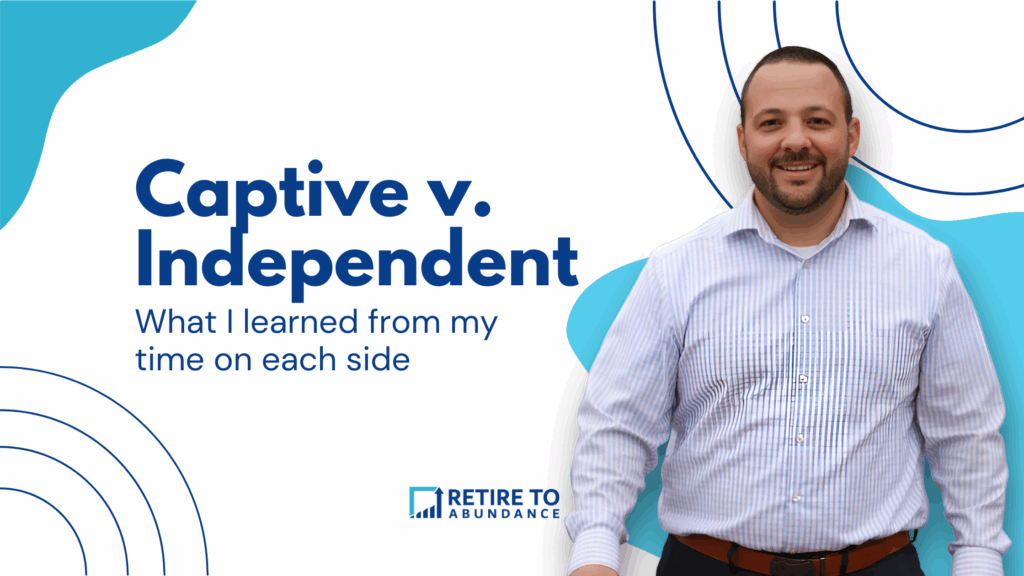When I started out in financial services, I worked nearly a decade as a captive agent for the Knights of Columbus. That meant I represented only their products — fixed life insurance and annuities. Today, at QED Wealth Solutions, I work independently as a financial planner. Insurance is still part of the work I do, but it’s one tool among many in building out a retirement plan.
Because I’ve lived in both worlds, I see things that most clients don’t. And while I’m obviously now biased toward the independent model, I want to lay out the honest pros and cons of each side.
When You’re a Hammer, Everything Looks Like a Nail
When I worked at the Knights of Columbus, every solution came from the same shelf. Need life insurance? We had one set of policies. Looking for retirement income? We had our annuity. And because that was all we had, it often got presented as the solution — even when something else might have fit better.
Let me be clear: most captive agents aren’t trying to mislead people. In fact, many genuinely believe their company offers the best options. That’s all they’ve been trained to see.
But when you only have a hammer, every problem starts looking like a nail.

Agent vs. Broker
There’s a technical distinction here that really matters.
- An agent represents the company.
- A broker represents the buyer.
Captive firms like State Farm, Northwestern Mutual, or the Knights of Columbus train their agents to represent the company’s products. As an independent broker, I represent the client, with access to multiple companies.
It’s a fundamental shift in alignment — and one of the main reasons I made the transition.
Incentives and Pressure
Commissions exist in both models, but captive agencies often add layers of pressure — sales quotas, annual bonuses, even incentive trips. Those things can steer recommendations more than people realize.
As an independent, I don’t have quotas tied to one company. Business is spread across carriers, which lessens the temptation to push something that may not be the best fit. My real incentive is long-term trust, since financial planning is about building ongoing relationships, not chasing one sale.
Choice vs. Mastery
One advantage of being captive was product mastery. I knew every detail of every Knights of Columbus contract, because that was all I sold. Today, at QED, I have access to a much wider product shelf. I don’t know every line of every policy, but I rely on specialists and due diligence to find the best fit. I used to be able to see a problem and know immediately the best Knights produce to address it. Now, it takes longer on my part to research and find the best available product for my client’s specific situation.
For clients, breadth usually matters more than depth. Having access to multiple options increases the odds of finding something that truly fits your needs.
Stability vs. Advocacy
Captive firms do offer stability. If your agent leaves or retires, the company is still there, and someone else will eventually step in.
Independents are more personal. If something happens to me, there isn’t a corporate office sending in a replacement. But the flip side is that when you find a good independent advisor, you gain a strong advocate who isn’t boxed in by one company’s limitations.

Fraud and Oversight
Here’s one area where captive companies have an advantage: oversight. With more corporate layers and compliance checks, it’s harder for fraud to slip through the cracks. Independents have more freedom, and while that’s usually good for clients, it also means bad actors have more room to operate.
The safeguard, either way, is choosing carefully. Longevity, local presence, and reputation matter. If someone has been in the community for years and can still look their neighbors in the eye at the grocery store, chances are they’re treating clients fairly.
Beyond Insurance
While I’m talking mostly about life insurance and annuities here, the same captive vs. independent question comes up in other areas too — auto and home insurance, Medicare, even investment firms. The dynamic is the same: one side offers stability and oversight, the other offers choice and flexibility.
But in my world at QED Wealth Solutions, insurance isn’t the whole picture. It’s one piece of a larger financial plan. Having the independence to integrate the right insurance products alongside investments, retirement income strategies, and tax planning is where the real value lies.
It Comes Down to Trust
Captive companies are strong, stable, and financially solid — if they weren’t, their business model wouldn’t work. Independent firms like mine offer more flexibility and client alignment, but require you to be more careful in choosing the right advisor.
Neither model is perfect. Both have conflicts of interest. Both have good people and bad people. What matters most is trust — finding someone competent, transparent, and invested in your long-term success. Because at the end of the day, it’s not about the logo on the card. It’s about the person across the table.
This post is for education and entertainment purposes only. Nothing should be construed as investment, tax, or legal advice.

